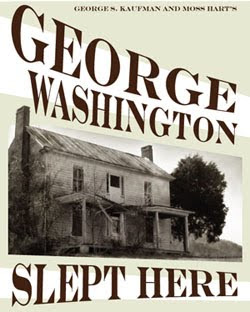
Sorry for the hiatus; turns out work sometimes is work. In any event, there was once a historic home located in Kingston, NJ which laid claim to one of the oldest tourist traps in America, that "Washington Slept Here." Then, the fates took a turn and the house was bought but needed for some reason or other to be moved. Moving houses, especially 200+ year old houses, is an impressive job but it can be done and some contractor successfully did it. The wife and I noticed, however, that when the house was moved, it brought with it the sign claiming "Washington Slept Here". Now, if we are generous and believe that Washington had indeed slumbered away in the place, it brings to question the accuracy of the claim. After all, Washington may indeed have slept in the house, but not there. It's a technicality, but one which can be important to some.
Similarly, Provincetown, MA is waging a campaign to be recognized as the real first landing place of the Pilgrims in New England. While just about all Americans know about Plymouth ("Plimouth Plantation") and its Rock, the question -- crucial for the tourist boards in both Provincetown and Plymouth -- is whether that Rock was really the first place a bunch of sea-sick refugee religious fanatics first set foot in the New World. The truth is....that Provincetown is right. The Pilgrims hit Cape Cod first and tried to create a settlement at Provincetown first, giving up and moving on to Plymouth shortly thereafter. So score one for Cape Cod. However, before they start popping champagne in Provincetown, they might want to read the Pilgrims' accounts of Cape Cod: "A hideous and desolate wilderness full of wild beasts and men." (A Voyage Long and Strange, by Tony Horwitz, 2008; Pg. 1) In other words, the Pilgrims abandoned their Provincetown settlement in 1620 because they hated the place. They may not want to emphasize that fact on the Provincetown tourist posters. Having visited Cape Cod I can assure you it is a pleasant enough place but my point is that accuracy is important in some respects, but may not be suitable for our current *uses* of history. But hey, if it's any consolation to the folks in Provincetown, none of the original Mayflower passengers' journals mention anything about Plymouth Rock either....
And anyway, whether Provincetown or Plymouth, we all know that Jamestown beat both, having been settled in 1607.....